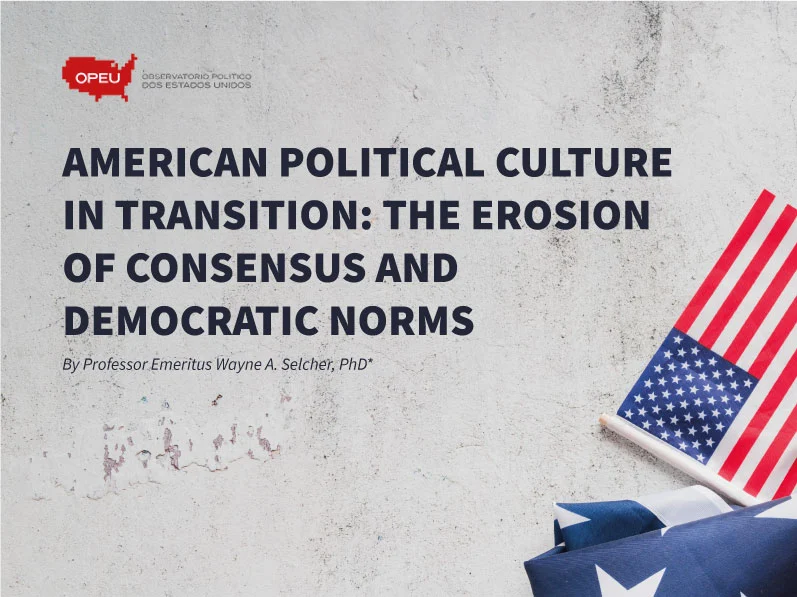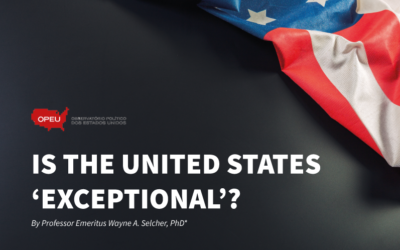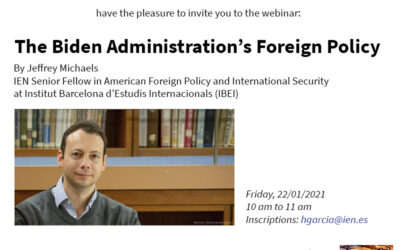American political culture in transition: The erosion of consensus and democratic norms

American political culture in transition: The erosion of consensus and democratic norms
By Professor Emeritus Wayne A. Selcher, PhD*
Abstract
This article identifies and examines the major characteristics, trends, and tendencies in American political culture and political performance that have been evolving in recent years, for a comprehensive picture of how Americans perceive and believe about their country and its political system. The analysis places the findings in a comparative perspective, provides relevant insights from other Western democracies, and discusses the implications of the findings for American democracy. Many links to high-quality, cost-free online sources are offered to facilitate further study of relevant aspects of the contemporary situation of the United States.
An Ongoing Crisis of National Unity, Identity, and Self-Confidence
The concept of “political culture” in political sociology can be defined as “The attitudes, beliefs, and values which underpin the operation of a particular political system. These were seen as including knowledge and skills about the operation of the political system, positive and negative emotional feelings towards it, and evaluative judgements about the system” (Oxford Reference). Political culture goes beyond short-term public opinion about particular events and personalities of a moment in time to examine the more enduring, broader, and deeper perceptions, norms, understandings, identities, and patterns that a population or a sector of that population develop and rely on in their political behavior. Political culture is the attitude environment within which political perception and activity take place. It changes over time, as both cause and consequence of concrete social, economic, and political events and forces.
When considering the many national poll results of attitudes used as references in this article, it is vital, for the sake of balance from the standpoint of the individual, to note from the outset that Pew Research found in May 2023 that family time is by far the most important aspect of life for Americans, not politics. Also to observe that, as demonstrated by Gallup, American polling exhibits a long-standing tendency for individuals to rate the quality of their personal lives and opportunities differently and much more favorably than they rate aspects of the national situation (at a ratio of five-to-one in January 2022), although the degree of difference varies over time.
At the national level, the validity of the formerly common nationalistic designation of the United States as “exceptional” has come into serious question in the last decade or so, as the country struggles with a crisis in national unity and self-confidence. The national unity implied by the “United We Stand!” slogan after the terrorist attacks of September 11, 2001 completely disappeared by the 2010s. In fact, the domestic aftermath of the terrorist attacks helped to create the current misinformation and conspiracy theory atmosphere that is skeptical of official narratives. A Washington Post-ABC poll on the twentieth anniversary of the attacks summarized: “Ahead of the 20th anniversary of the attacks on the World Trade Center and Pentagon on Saturday, more than 8 in 10 Americans say those events changed the country in a lasting way. Nearly half (46 percent) say the events of 9/11 changed the country for the worse, while 33 percent say they changed the country for the better.”
The two resultant major wars did not turn out well for the United States or in American public opinion–the military mission in Afghanistan failed embarrassingly after two decades, as the Taliban returned to power in August 2021, while Iran now has more influence in Iraq than the United States does. The “Long War” against terrorism has been replaced as a central concern by rising competition with China and reactions to the ongoing 2022 Russian invasion of Ukraine. The 2008 and 2023 bank failures and the post-COVID inflation rate made many Americans question the basic health of the financial system and the economy. The COVID pandemic of 2020 into 2022 had the net effect of sharply dividing the country ideologically, pro and anti-vaccination and regarding government mandates during the pandemic, with a consequent challenging of the overwhelmed governmental and health care institutions.
In mid-2023, according to Gallup, a “near-record low” of 39 percent were “extremely proud” to be Americans, with 60 percent of Republicans, 29 percent of Democrats, and 33 percent of independents expressing that level of feeling. Younger generations (18 to 29 years of age) tend to be more critical of the current national situation and to show less pride in being American, given the experiences of their lifetimes.
Want to Read More?
The full text of this publication is available via Observatorio Politico dos Estados Unidos.
The Author

Wayne A. Selcher, Ph.D. is Professor of International Studies Emeritus, Department of Politics, Philosophy, and Legal Studies, Elizabethtown College, PA, USA. His major academic interests are Comparative Politics, US Foreign Policy, Latin American Politics and Foreign Policy (especially Brazil), and Internet use in international studies teaching and research. He is the creator and editor of the WWW Virtual Library: International Affairs Resources, a web guide for online international studies research in many topics.
E-mail: wayneselcher@comcast.net

